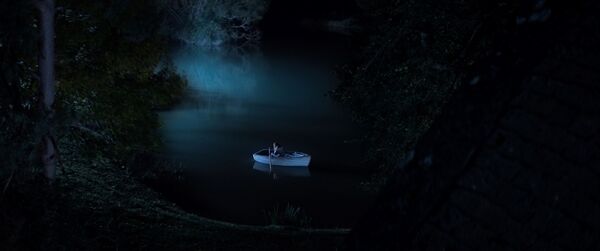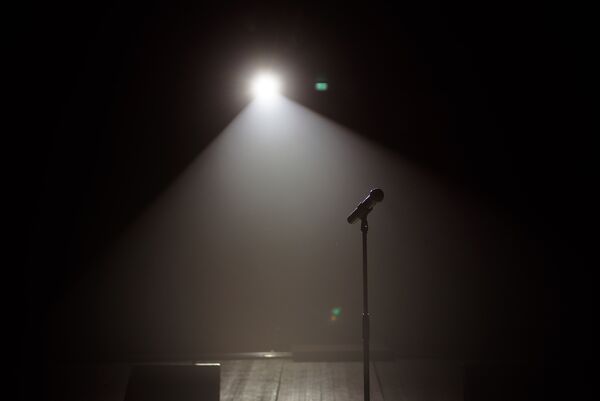
Dead Centre Q&A: Beckett's Room
A play without performers; a biography of a room. Step into a unique immersive stage experience like no other.
In the run-up to the UK premiere of Beckett’s Room, Dead Centre’s co-founder and co-artistic director Bush Moukarzel tells us more about the ground-breaking production which explores an early pre-fame chapter in the life of iconic Irishman Samuel Beckett – one of the defining writers of the 20th century – and his partner (later wife) Suzanne. Dead Centre are no strangers to Warwick Arts Centre, having previously visited us with Hamnet in 2019.
Can you tell us a bit about your approach to the production?
You hear the actors [including Irish actor Brian Gleeson], but there's no performers in it. It's moving objects and headphones with these binaural recordings - you hear the sounds spatially move, and you see the objects move to the sound design.
What's the time frame for the piece?
We start in the war [early 1940s]. The first act is when they were working for this Resistance cell, called Gloria, which they were both associated with through Suzanne - she was a Communist and had connections with underground political movements, while Beckett was also politically minded and against fascists. He was doing translating work for messages that were then coded and sent back to the Allies.
Scholars have made much of the fact that Beckett was working with coded messages, drawing links with his use of language in later published writings, especially the novel Watt.
Yes. When he was returning to Ireland after the war, and onto England, he had a manuscript of Watt with him, and the British authorities seized it because they thought it was code! They read it - he said, it was 'just my book', but they didn't believe him. But eventually they gave it him back and he tried to get it published, and he failed. He thought he was a failed writer after that.
Have you drawn any parallels with that period of the 20th century, and today? Although we're not at war, there's certainly been a rise in nationalism across Europe, and Brexit too.
[While we were researching] Brexit happened, yes! To everyone's surprise nationalism is still a topic, and the fragility of Europe too! I'm not sure if Brexit was at the forefront of our mind, but how startling that division was. Brexit aside, the questioning on the European project and nationalism as a response to that regrettably still being such a major issue in the world was in our mind - there were parallels in our mind.
What's an Irishman doing in France, at that time, joining for the Resistance and preferring - as he said - France in wartime to Ireland in peacetime. What kind of mentality? And I s'pose it is a European one that he was fighting for, an idea, rather than identifying himself as Irish where he can wash his hands of the whole thing as Ireland was neutral. Beckett actually travelled to Paris during the war, so he could be in the thick of things.
You started to develop a project called Beckett's First Play - what's the relationship between that and Beckett's Room?
This is that! But the Beckett estate, who we strictly speaking didn't need permission from for anything as we're not using any of his work, didn't like it. Dublin is so small and everyone knows everyone, so it would've been prudent to get the blessing of the estate for the project, so we were dialoguing with Edward Beckett - well I wasn't our Dramaturg [Nicholas Johnson] was, he's Professor at Trinity College, runs the Beckett Summer School. We could have gone on without Edward’s approval, there wasn't any copyright issue, but [because he didn’t like the title Beckett’s First Play] we changed the title to Beckett's Room.
Beckett's first play was Eleutheria ...
There's no permissions to perform it. It's in print, or rather you can get second hand copies from when it was briefly in print. He wrote Eleutheria and wrote Waiting For Godot and curiously Suzanne was shopping them around the theatres in Paris when they returned after the war, funnily enough with the idea of either of them being put on - like they were on an equal artistic footing. Which they certainly weren't! One is an overstuffed parody of absurdist theatre from that era ... and the other is a work of exceptional minimalism which changed the face of 20th century theatre! Waiting For Godot got put on because it was cheaper - it was two guys and an overcoat - whereas the other one was a cast of 15, multiple locations, and really un-Beckettian! And it was really after Waiting For Godot was put on by Roger Blin at the Théâtre de Babylone in, Paris, in 1953, that Beckett thought, 'Oh yeah! I'll do that!' And the other one was suppressed. I was curious about that, but didn't want to put it on - it's not great. But once copyright is lifted I can't wait for someone inventive to find a way to do something brilliant with it - but on the page it's crap.
- Beckett’s Room runs from Saturday 4 to Tuesday 7 December 2021, with performances at 7.30pm. For tickets, see: Dead Centre – Beckett’s Room.
Recent News

Touring Together: An Exciting New Collaboration
We're excited to share the news that Warwick Arts Centre is taking part in a new collaboration with China Plate and Fuel. Touring Together is a three-year…

Opening Daniel's Room
Warwickshire filmmaker Jack Richardson follows the multi-award-winning Who Wants To Be Me? with his directorial debut, Daniel's Room. With a cast and…

Seed Funding for Midlands based artists –open call-out!
Made in the Midlands returns to Warwick Arts Centre: celebrating, supporting, and developing artists and companies from across the region’s vibrant creative…
